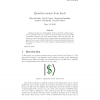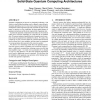64 search results - page 4 / 13 » Secure multi-party quantum computation |
WISEC
2010
ACM
13 years 11 months ago
2010
ACM
Currently, companies are about to optimize their internal processes by monitoring items they handle with Radio Frequency Identification (RFID). However, there is a risk that sens...
CORR
2010
Springer
13 years 4 months ago
2010
Springer
Quantum money is a cryptographic protocol in which a mint can produce a quantum state, no one else can copy the state, and anyone (with a quantum computer) can verify that the sta...
STOC
2002
ACM
14 years 6 months ago
2002
ACM
Secure multi-party computing, also called secure function evaluation, has been extensively studied in classical cryptography. We consider the extension of this task to computation...
SPAA
2003
ACM
13 years 11 months ago
2003
ACM
Quantum computation has become an intriguing technology with which to attack difficult problems and to enhance system security. Quantum algorithms, however, have been analyzed un...
CORR
2010
Springer
13 years 5 months ago
2010
Springer
Quantum Cryptography or Quantum key distribution (QKD) is a technique that allows the secure distribution of a bit string, used as key in cryptographic protocols. When it was note...


